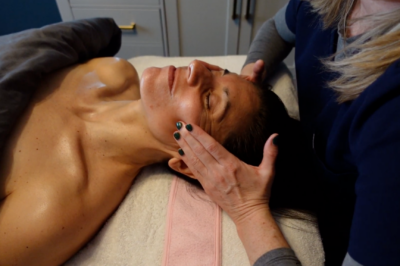You may have heard that the eyes are the windows to the soul, but did you know that the skin betrays emotions? Sweat glands are controlled by the sympathetic nervous system, and the skin itself actually conducts electricity, which is why skin sensors are used during lie detector tests. A change in the skin can indicate psychological arousal.
Emotions will affect your skin health. Fear, anger, stress, and more register not only in our minds, hearts, and guts, but in our skin as well. That’s why people who have skin conditions like psoriasis may find that they experience more flare-ups during stressful times.
The problem is that psoriasis itself can cause stress. The red, scaly patches can be embarrassing and frustrating, causing more negative emotions that can, in turn, create additional flare-ups. If you suffer from psoriasis and are finding the emotional burden difficult, here are some tips that may help.
Psoriasis can take a heavy toll on your emotional health.
Try these tips to help you cope.
The Emotional Toll of Psoriasis
According to the National Psoriasis Foundation, people with psoriasis experience higher rates of depression and anxiety, and are twice as likely to have thoughts of suicide as those without the disease. Studies show that those with the most severe form of the skin condition have a whopping 72 percent increased risk of depression. More than 80 percent of those surveyed said the disease was a moderate or large problem in their everyday lives, while 25 percent reported that psoriasis negatively affected their jobs. People also report feeling self-conscious, embarrassed, and helpless.
Unfortunately, many people with the disease suffer in silence, coping by avoiding going out in public, abusing alcohol, or overeating. These habits can make depression and anxiety worse, say nothing of overall health.
Tips to Help You Cope
The first step is to identify your triggers—those things that seem to encourage flare-ups—and try to limit those in your life. In addition to stress, sun exposure, poor diet, and synthetic fabrics may set off a psoriasis attack.
Next, do everything you can to better manage the stress in your life—both the stress that affects you on a daily basis, and the stress that comes specifically from your psoriasis. Here are some tips for how to do that:
- Accept yourself. This can be the hardest part of the disease. If you can accept that you have it, however, you can better calm your emotions. Watch how you typically think about the disease—do you get angry when you get a flare-up? Do you feel like your body is betraying you? If so, you may need to change how you view the disease. It’s not a result of something wrong with you. Instead, it’s simply a malfunction in the immune system. In truth, your body is trying to cope as best it can. Would you feel angry or ashamed at a friend with the same condition? Try to treat yourself with loving kindness. Decide that from now on, you will be only kind and supportive to yourself and your skin.
- Meditate: There are numerous studies about the benefits of meditation, but it can be difficult to begin. Think of it this way—simply find time every day to sit quietly for 10-15 minutes. Try during that time to calm your racing thoughts. Focus on one thing, like a candle flame, a light, or an image of your favorite place. Let the thoughts come and go. Don’t respond to them. If you find your thoughts wandering, bring them gently back to your chosen focal point. In this way, you train your brain to calm down when you want it to. You can later use these skills when you feel your stress levels rising.
- Dress it up. One of the biggest challenges for psoriasis sufferers is how to cover up a flare-up. They can be embarrassing, and others often don’t understand that the condition is not contagious. Decide to get creative with your fashion. Have a flare-up on your neck? Find a favorite decorative scarf made with luxurious materials that you can wear. Suffering scales on your arms? Find loose-fitting, natural long-sleeve shirts or dresses that look great on you. Suffering from red hands? Wear thin, pretty gloves. Wearing something that makes you feel fashionable and pretty will help you cope better when your skin doesn’t look as good as you’d like. Go crazy. You deserve it.
- Talk about it. Thousands of people with psoriasis have benefitted from joining support groups. Find one in your local area, or try an online forum. (Examples include: psoriasis.supportgroups.com, inspire.com/groups/talk-psoriasis and dailystrength.org/c/Psoriasis/support-group.) There’s no substitute for talking about your feelings with others who understand where you’re coming from.
- Use stress-relieving techniques you enjoy. Have you tried yoga? Tai chi? Find something you enjoy that you can get lost in. Something that helps get your mind off of the psoriasis. For you, that may be hiking, cooking, camping, playing music, painting, photography, gardening, reading, or a number of other activities. It’s not selfish to make time to enjoy yourself—it’s critical to your health!
- Be willing to try new things. If one treatment doesn’t help your psoriasis, don’t give up. There are a number of potential treatments, both medical and natural, that may reduce your flare-ups. Realize that every time you improve your condition just a little bit, you will feel better—isn’t that worth a little trial and error?
- Don’t let it stop you. The worst thing you can do is let psoriasis start to control your life. If you find yourself avoiding public outings or reducing your activities because of your skin lesions, consider talking to a therapist. Your life is far too valuable and you have too much to offer to let a skin condition stop you. Celebrities like LeAnn Rimes, Art Garfunkel, golfer Phil Mickelson, novelist John Updike, actor Jon Lovitz, and even Kim Kardashian deal with the disease. If they can cope with it and still go after their dreams, why not you?
Do you have other tips for managing the emotional side of psoriasis? Please share your tips with us.
* * *
Sources
“Psoriasis and Mental Health Issue Brief,” National Psoriasis Foundation, http://www.psoriasis.org/document.doc?id=350.
Ben Karris, “10 Celebrities with Psoriasis,” Healthline, December 5, 2012, http://www.healthline.com/health-slideshow/psoriasis-famous-people#10.







Constantly worried, and trying to hide psoriasis condition from friends and colleagues, will cause stress and anxiety that could lead to depression. Try to release stress by engaging in positive activities eg meditation.